
94% of researchers rate our articles as excellent or good
Learn more about the work of our research integrity team to safeguard the quality of each article we publish.
Find out more
CONCEPTUAL ANALYSIS article
Front. Commun., 17 February 2025
Sec. Health Communication
Volume 10 - 2025 | https://doi.org/10.3389/fcomm.2025.1490292
 Daniel Romer*
Daniel Romer* Kathleen H. Jamieson
Kathleen H. JamiesonWe review research we conducted from the first through the 3rd year of the COVID pandemic that identified conspiracy mindset as an important source of vaccination resistance in the United States (US). We show that the mindset was highly related to the acceptance of misinformation about the safety and efficacy of vaccination, including the vaccines against COVID-19. We show that its effects were overcome to some extent in racial-ethnic and political groups that were likely to have received supportive information from sources trusted within their group. At the same time, some of our evidence suggests that media sources that promoted conspiracy theories about vaccination and the pandemic likely intensified conspiracy mindsets and with it, vaccination resistance. Our findings suggest that efforts countering misinformation cannot rely on simply correcting falsehoods but should also involve engaging trusted leaders who can reassure the conspiracy minded that the recommended action is safe and effective.
In this Conceptual Analysis, we review our recent research on the role of conspiracy mindset as a barrier to acceptance of vaccination, especially in the context of the COVID pandemic in the US. We focus on the strong relation between the mindset and the acceptance of misinformation about vaccination and the origins of the pandemic. While this played a strong role in resistance to vaccination in the US, we found that it was possible to overcome this resistance if those holding the mindset were exposed to trusted sources who emphasized the importance of vaccination. At the same time, sources who cultivated conspiratorial explanations for the pandemic tended to reinforce belief in misinformation. We conclude that countering conspiracy mindsets during a health crisis can be successful if it originates from trusted sources. Simply providing supportive information is unlikely to overcome belief in the misinformation that accrues among the conspiracy minded.
Early in the pandemic we identified conspiratorial beliefs about the origin of the pandemic and the ability to control it as obstacles to the adoption of preventive behaviors, such as mask wearing and social distancing (Romer and Jamieson, 2020). In that study, we followed a nationally representative panel of over 800 respondents during the 1st year of the pandemic. Conspiracies are defined as activities conducted in secret that influence the actions of government and other centers of power to advantage those actors but harm the wider public (Douglas et al., 2017). For example, the belief that “Some in the U. S. Centers for Disease Control and Prevention, also known as CDC, are exaggerating the danger posed by the coronavirus to damage the Trump presidency” grew in acceptance over the 1st year of the pandemic and predicted resistance to accepting a forthcoming COVID-19 vaccine as well as other preventive measures (Jamieson et al., 2021; Romer and Jamieson, 2021a). Similar results were reported by other researchers in the US and elsewhere (Bierwiaczonek et al., 2022; Earnshaw et al., 2020).
We were intrigued by the possibility that the uptake of conspiracy beliefs at the outset of the pandemic was primarily driven by persons who harbored a conspiracy mindset. Although belief in conspiracies was noted as early as 1964 as an American phenomenon by Hofstadter (2008), the assessment of this mindset was first conducted by Goertzel (1994) who found that while nearly everyone endorsed at least one conspiracy, some tended to endorse multiple examples. He called them “monological conspiracy thinkers” and later researchers developed other measures to assess what has become known as a conspiracy mindset (Bruder et al., 2013).
We used a three-item measure of conspiracy mindset that assesses global beliefs about the presence of actors who work in secret to harm the public (e.g., Much of our lives is controlled by plots hatched in secret places; Uscinski et al., 2016). The scale has high reliability (alpha = 0.81; Romer and Jamieson, 2021a) and correlates highly with other measures that assess the mindset in the way that Goertzel did, namely by asking about specific conspiracies (Goertzel, 1994; Romer and Jamieson, 2022). We found strong evidence for the importance of the mindset when we found that it was strongly related to belief in the same conspiracies that were found to impede adoption of recommended preventive behavior during the 1st year of the pandemic (Romer and Jamieson, 2021a).
In the 2nd year of the pandemic when the vaccine became widely available, we began following the reported uptake of the vaccine and tracked the factors associated with its acceptance (Romer et al., 2024, 2022). At the beginning of 2021, we also recontacted individuals who had participated in an earlier 2019 nationally representative panel that assessed MMR and flu vaccination beliefs (Romer and Jamieson, 2022). The follow-up survey with over 1,200 respondents enabled us to identify early predictors of resistance to COVID vaccination, including a conspiracy mindset, that were in place before the pandemic began. We provide examples of the measures used to assess conspiracy mindsets and misinformation about COVID vaccines in the online Appendix.
The follow-up survey found that conspiratorial tendencies that were present in 2019 were strongly predictive of the uptake of misinformation about both the COVID-19 vaccines and the origin of the pandemic. Persons who had the mindset a year before the onset of the pandemic were much more likely to accept misinformation about the harms of COVID and other vaccines in 2021, such as that the vaccine could change one's DNA or produce harmful side effects, and much less likely to report willingness to take the COVID-19 vaccine, findings underscoring the effects of this mindset on hesitancy to take a new vaccine (Romer and Jamieson, 2022).
Importantly, we found that those with the mindset also were more likely to follow conservative media that both promoted conspiracies about the pandemic and downplayed the seriousness of the threat to health that it posed (Romer and Jamieson, 2021a, 2022). The use of conservative media was associated with greater resistance to vaccination among Republicans, underscored by then President Donald Trump who posited the existence of a conspiratorial “deep state” in the US government's health agencies. He claimed that those actors were determined to undercut his re-election chances by exaggerating the threat of the pandemic and delaying announcement that the vaccines in development had proven safe and efficacious (Douglas et al., 2017; Romer and Jamieson, 2021a).
While the conspiratorial tendencies of Republicans intensified over the 1st year of the pandemic, they diminished among Democrats (Romer and Jamieson, 2022). As we review here, partisan polarization, media reinforcement, and a predisposition to accept conspiracies help explain why compared to many countries in Europe, the US lagged in vaccinating its eligible population, experienced higher rates of fatalities attributable to COVID as the pandemic unfolded (Mueller and Lutz, 2022), and experienced more Covid-19 deaths in locales that supported Trump's re-election (Wallace et al., 2023).
In a study with a nationally representative panel with over 1,600 members, we examined the relation between conspiracy mindset measured at the first wave (April 2021) and acceptance of misinformation at both the first and the seventh wave in June 2022. The demographic characteristics of the panel remained remarkably stable over time, enabling comparisons in beliefs and behavior across waves. Not surprisingly, the misinformation index was stable over time (r = 0.76), and as seen in Figure 1, its standardized relation with the mindset was powerful and persisted across multiple waves into the spring of 2022 (Romer and Jamieson, 2023). The correlations between the mindset and misinformation were 0.70 and 0.67 at the first and last waves, respectively.
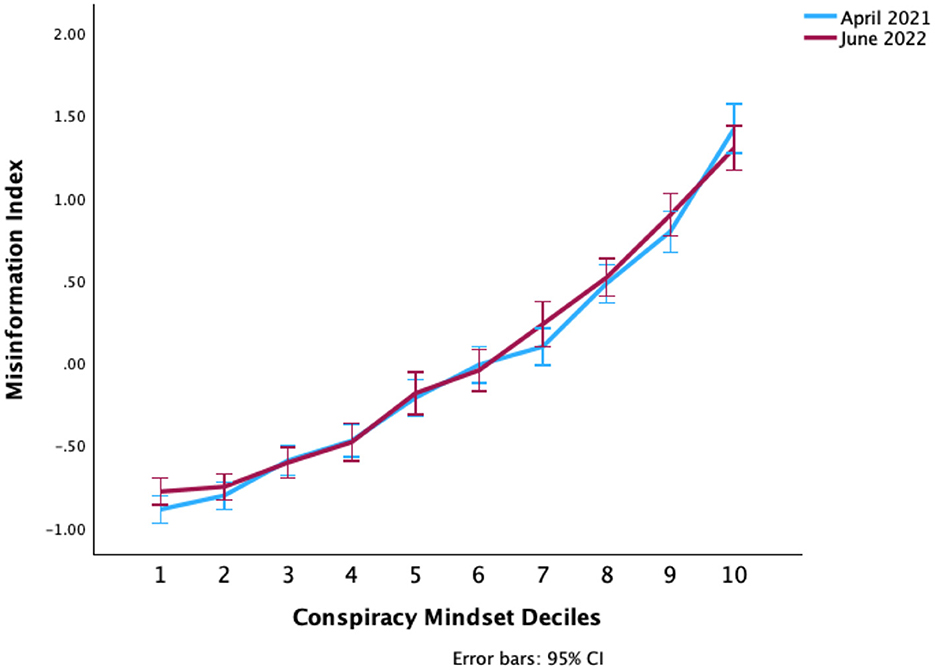
Figure 1. Vaccination misinformation assessed in April 2021 and in June 2022 in relation to conspiratorial mindset assessed at the first wave. The misinformation index is a standardized score based on the first principal component of belief in unsubstantiated claims about COVID and other vaccines. Error bars represent 95% confidence intervals.
Despite the tight relation between mindset and misinformation, there were large differences in mindsets according to both racial-ethnic and political party identity, with White Americans harboring less extreme mindsets on average than Black and Hispanic Americans, and those identifying as Democrats displaying weaker mindsets than those identifying as Republicans or with other parties (see Figure 2).

Figure 2. Average levels of conspiratorial mindset by (A) racial-ethnic identity and (B) political party. Error bars represent 95% confidence intervals with the scores standardized ranging from −1.5 to 2.5. The panel represented 66% White, 9.6% Black, 11.9% Hispanic, and 8.3% Asian respondents; it represented 48% who identified or leaned Democratic, 33% who identified or leaned Republican and 19% who identified with neither party.
The higher levels of the mindset in racial-ethnic minorities was not unexpected, as it was observed earlier in the first study of the mindset by Goertzel in the US (Goertzel, 1994). It is also consistent with research on “medical mistrust,” which is higher in Black Americans likely due to their experiences of maltreatment by the medical system (Jaiswal and Halkitis, 2019). In addition, the greater level of the mindset in Republicans was consistent with our finding that those identifying with that party became more conspiratorial from 2019 to 2021, and those identifying as Democrats became less so (Romer and Jamieson, 2022).
Our panel from 2021 to 2022 also gave us the opportunity to observe the uptake of COVID vaccination over that time period. As we had found before when assessing vaccination intentions (Romer and Jamieson, 2021a, 2022), COVID vaccination rates were strongly related to the mindset, with those with the mindset much more resistant to receiving the recommended two-dose vaccine. Nevertheless, the overall trend in the US was an increase in acceptance of vaccination, suggestive of a social diffusion process that over-rode some of the vaccination hesitancy attributable to the mindset (Figure 3).
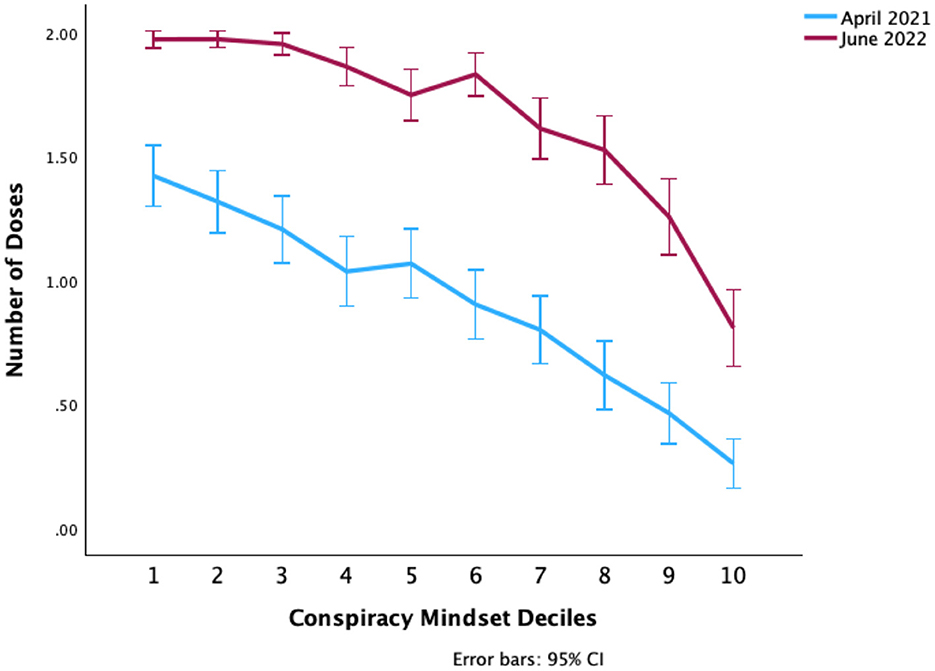
Figure 3. Reported number of the two recommended doses received across time in relation to conspiracy mindset. Receipt of the Johnson and Johnson vaccine was recorded as two doses. Error bars represent 95% confidence intervals.
There was also evidence of differential change in misinformation according to race-ethnicity and political party. As seen in Figure 4, for White respondents, there was a slight increase in acceptance of misinformation over time. While for the other groups, there was a decline, an effect that was strongest among Black respondents controlling for a host of other factors (Romer et al., 2024).
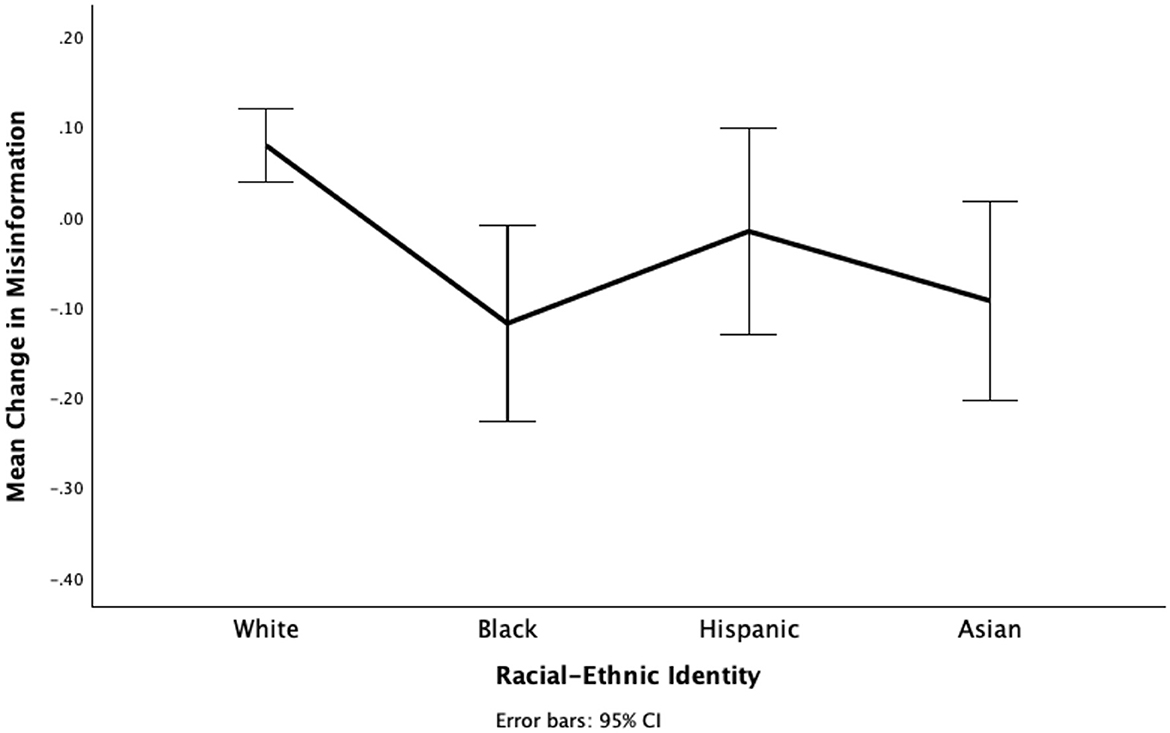
Figure 4. Change in belief in misinformation from April 2021 to June 2022 by racial-ethnic identity. Error bars represent 95% confidence intervals.
As we have reported, there was also differential change according to political party, with Democrats and those with other identities displaying a decline and Republicans an increase in acceptance of misinformation (Figure 5; Romer et al., 2022).
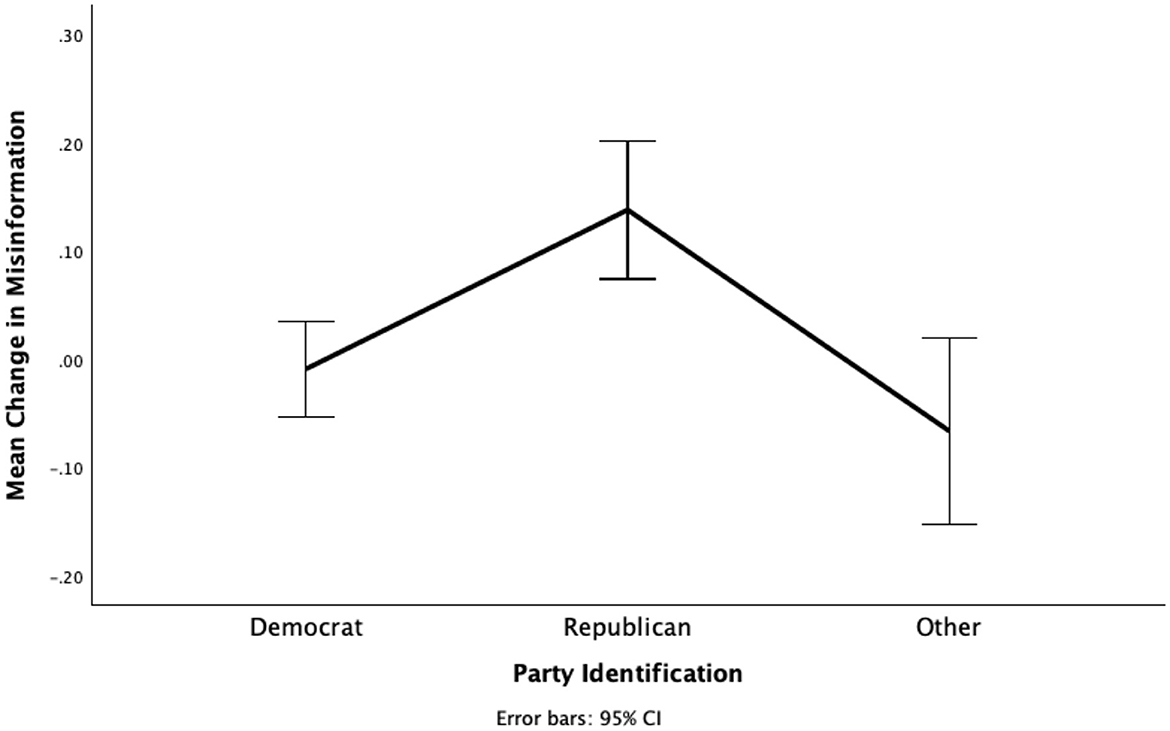
Figure 5. Changes in acceptance of misinformation from April 2021 to June 2022 by political party identity. Error bars represent 95% confidence intervals.
Despite differences in conspiratorial tendencies, all three non-white groups showed greater increases in vaccination rates over time than White respondents, who were more likely to include Republican party adherents (Figure 6). As a result, there were no longer large differences in vaccination rates between the racial-ethnic groups at the final wave (Romer et al., 2024). However, the increase in vaccination for Black respondents was particularly mediated by declines in misinformation. In addition, as we have reported, Democrats and independents received vaccination to a greater extent than Republicans (Figure 7; Romer et al., 2022).
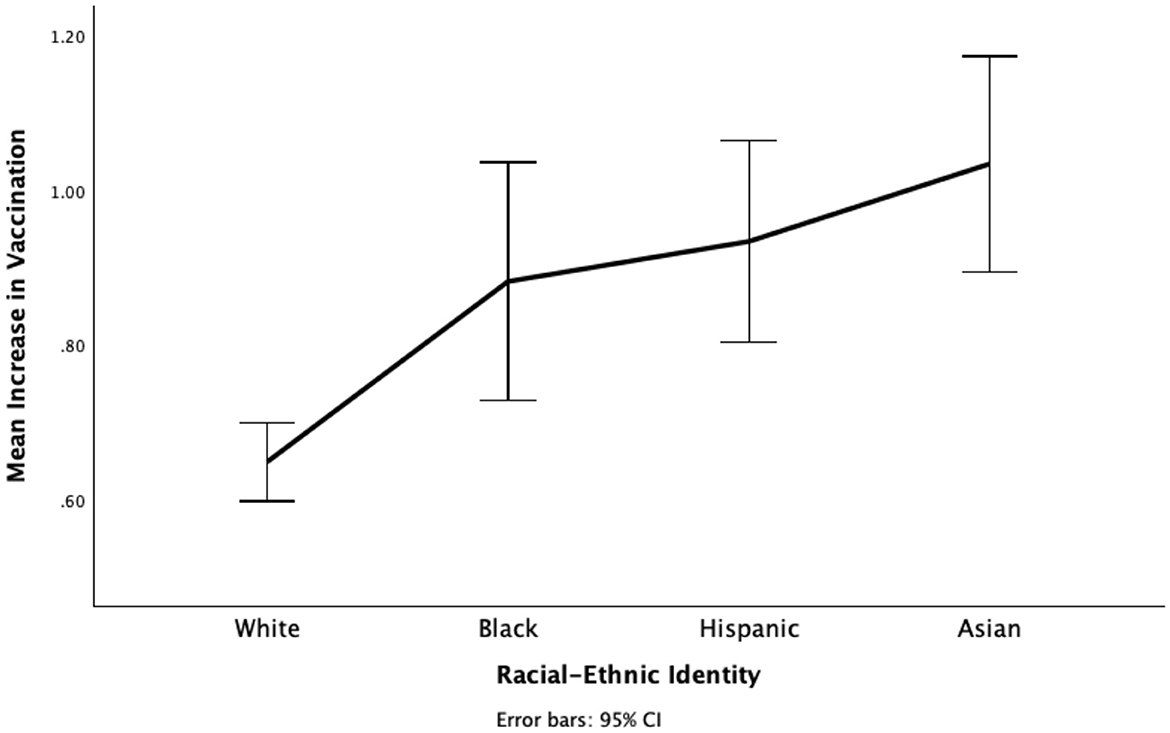
Figure 6. Increases in vaccination rates from April 2021 to June 2020 in relation to race-ethnicity. Error bars represent 95% confidence intervals.
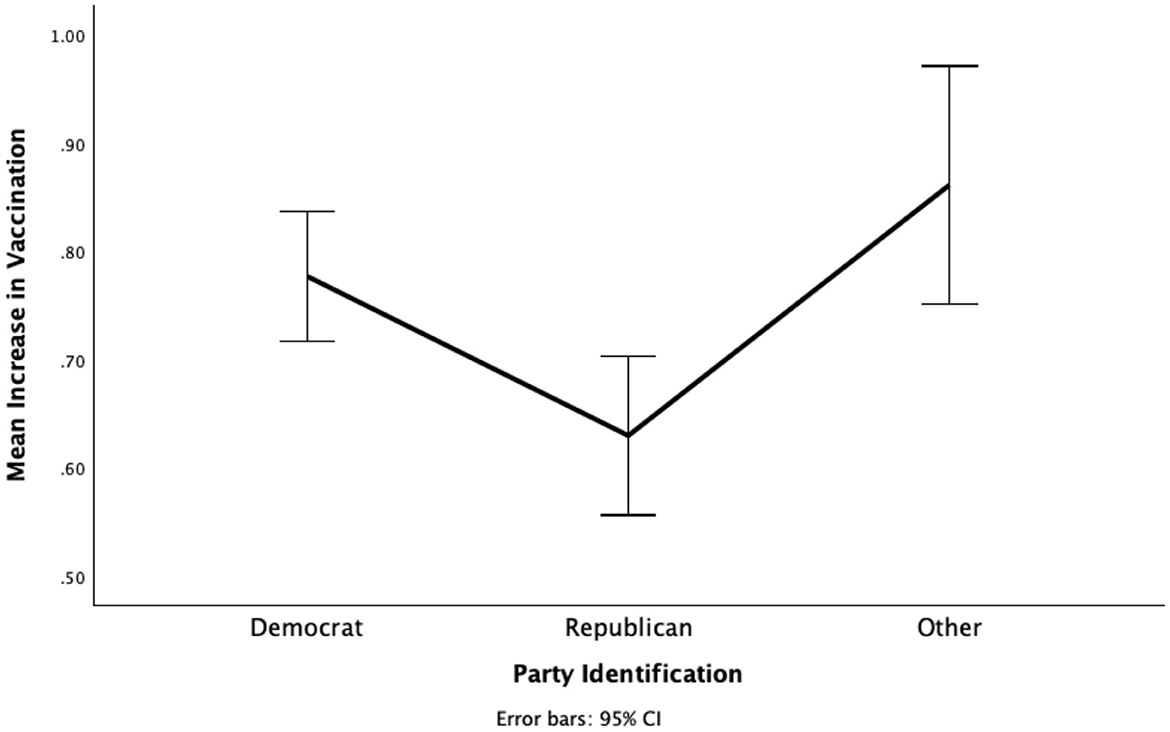
Figure 7. Changes in vaccination rates from April 2021 to June 2022 in relation to political party identity. Error bars represent 95% confidence intervals.
These patterns in both misinformation and vaccination indicate that conspiracy mindsets played a large role in the acceptance of misinformation. Our analyses also found that differences in mindsets were related to differences in media use. Mainstream media in the US tended to support the vaccination effort, often featured people receiving the vaccine and likely enhanced the social diffusion of the behavior. The overall rise in vaccination even among those with the mindset is consistent with such a diffusion process. Conservative media such as Fox News tended to undercut the effort, and our studies showed greater reliance on those sources by those with a conspiracy mindset (Jamieson et al., 2021; Romer and Jamieson, 2022, 2021b).
Although media use was a strong factor in acceptance of misinformation, for Black Americans, reduced acceptance of misinformation appeared to be more related to communication within their local communities. We found little evidence that differential use of mainstream, conservative, or national media directed toward non-white audiences played much of a role. Instead, it was likely that acceptance of vaccination was led by Black owned local newspapers and religious leaders who advocated vaccination (Romer et al., 2024). Black Americans are also more likely to identify with the Democratic party, which may also have blunted conspiratorial tendencies regarding vaccination. Similar approaches appeared to be successful in Hispanic communities (Pratt, 2021).
In total, the explanation that best fits our findings is that pro-vaccination messaging coming from trusted sources was able to overcome conspiratorial tendencies. For Black Americans, sources from within one's group likely helped to overcome conspiratorial tendencies to distrust the medical system and health authorities resulting in greater uptake of the vaccines. Simply being exposed to pro-vaccination information through mainstream media alone was unlikely to alter the beliefs of those with a predisposition to discredit that information. Similarly, Republicans who were prone to rely on conservative media were more likely to accept misinformation. However, when they received messages from members within their own party that supported vaccination, they were more likely to accept that action (Larsen et al., 2022; Pink et al., 2021). The same can be said about Democrats since the newly elected President and leader of their party was wholeheartedly in favor of vaccination.
We take these conclusions to suggest that countering misinformation will require sensitivity to the mindsets of the audience and the sources who are seen as trustworthy. For those who are simply misinformed, especially in the early phases of a health crisis, correcting their misinformation through mainstream media may be effective. However, for those with strong levels of mistrust of authorities, especially in the health system and mainstream media, simple corrections will not be persuasive. Persons with the mindset are prone to discount messages coming from sources they do not consider credible.
Conspiratorial mindsets appear to pose challenges to vaccination around the world, and so our case study in the US is likely to also apply elsewhere (Hornsey et al., 2018). With the return to the US presidency by Donald Trump, we can expect even greater challenges in the future should a health emergency reemerge. Countering mistrust is the first order of business in countering misinformation among some audiences, but encouraging supportive messages from within the distrustful community may be able to overcome the resistance.
The studies involving humans were approved by University of Pennsylvania Institutional Review Board. The studies were conducted in accordance with the local legislation and institutional requirements. The participants provided their written informed consent to participate in this study.
DR: Conceptualization, Data curation, Investigation, Methodology, Project administration, Supervision, Writing – original draft, Writing – review & editing. KJ: Conceptualization, Data curation, Funding acquisition, Investigation, Methodology, Project administration, Writing – original draft, Writing – review & editing.
The author(s) declare financial support was received for the research, authorship, and/or publication of this article. The Robert Wood Johnson Foundation supported the research but was not involved in the design of the studies or their interpretation.
The authors declare that the research was conducted in the absence of any commercial or financial relationships that could be construed as a potential conflict of interest.
The author(s) declared that they were an editorial board member of Frontiers, at the time of submission. This had no impact on the peer review process and the final decision.
All claims expressed in this article are solely those of the authors and do not necessarily represent those of their affiliated organizations, or those of the publisher, the editors and the reviewers. Any product that may be evaluated in this article, or claim that may be made by its manufacturer, is not guaranteed or endorsed by the publisher.
The Supplementary Material for this article can be found online at: https://www.frontiersin.org/articles/10.3389/fcomm.2025.1490292/full#supplementary-material
Bierwiaczonek, K., Gundersen, A. B., and Kunst, J. R. (2022). The role of conspiracy beliefs for COVID-19 health responses: A meta-analysis. Curr. Opin. Psychol. 46:101346. doi: 10.1016/j.copsyc.2022.101346
Bruder, M., Haffke, P., Neave, N., Nouripanah, N., and Imhoff, R. (2013). Measuring individual differences in generic beliefs in conspiracy theories across cultures: conspiracy mentality questionnaire. Front. Psychol. 4, 1–15. doi: 10.3389/fpsyg.2013.00225
Douglas, K. M., Sutton, R. M., and Cichocka, A. (2017). The psychology of conspiracy theories. Curr. Dir. Psychol. Sci. 26, 538–542. doi: 10.1177/0963721417718261
Earnshaw, W. A., Eaton, L. A., Kalichman, S. C., Brousseau, N. M., Hill, E. C., Fox, A. B., et al. (2020). COVID-19 conspiracy beliefs, health behaviors, and policy support. Transl. Behav. Med. 10, 850–856. doi: 10.1093/tbm/ibaa090
Goertzel, T. (1994). Belief in conspiracy theories. Polit. Psychol. 15:731–742. doi: 10.2307/3791630
Hornsey, M. J., Harris, E. A., and Fielding, K. S. (2018). The psychological roots of anti-vaccination attitudes: a 24-nation investigation. Health Psychol. 37, 307–315. doi: 10.1037/hea0000586
Jaiswal, J., and Halkitis, P. N. (2019). Towards a more inclusive and dynamic understanding of medical mistrust informed by science. Behav. Med. 45, 79–85. doi: 10.1080/08964289.2019.1619511
Jamieson, K. H., Romer, D., Jamieson, P. E., Winneg, K. M., and Pasek, J. (2021). The role of non-COVID-specific and COVID-specific factors in predicting a shift in willingness to vaccinate: a panel study. Proc. Natl. Acad. Sci. 118:e2112266118. doi: 10.1073/pnas.2112266118
Larsen, B., Hetherington, M. J., Greene, S. H., Ryan, T. J., Maxwell, R. D., Tadelis, S., et al. (2022). Using Donald Trump's COVID-19 vaccine endorsement to give public health a shot in the arm: a large-scale ad experiment. Available at: www.nber.org/papers/w29896
Mueller, B., and Lutz, E. (2022). U. S. has far higher covid death rate than other wealthy nations. The New York Times. Available at: https://www.nytimes.com/interactive/2022/02/01/science/covid-deaths-united-states.html (accessed February 1, 2022).
Pink, S. L., Chu, J., Druckman, J. N., Rand, D. G., and Willer, R. (2021). Elite party cues increase vaccination intentions among republicans. Proc. Natl. Acad. Sci. 118:e2106559118. doi: 10.1073/pnas.2106559118
Pratt, T. (2021). Covid vaccinations among US Latinos are rising thanks to community outreach. The Guardian. Available at: https://www.theguardian.com/world/2021/sep/19/covid-vaccinations-latinos-rising-community-outreach (accessed September 19, 2021).
Romer, D., and Jamieson, K. H. (2020). Conspiracy theories as barriers to controlling the spread of COVID-19 in the U. S. Soc. Sci. Med. 263:113356. doi: 10.1016/j.socscimed.2020.113356
Romer, D., and Jamieson, K. H. (2021a). Conspiratorial thinking, selective exposure to conservative media, and response to COVIC-19 in the US. Soc. Sci. Med. 291:114480. doi: 10.1016/j.socscimed.2021.114480
Romer, D., and Jamieson, K. H. (2021b). Patterns of media use, strength of belief in COVID-19 conspiracy theories, and the prevention of COVID-19 from March to July 2020 in the US. J. Med. Internet Res. 23:e25215. doi: 10.2196/25215
Romer, D., and Jamieson, K. H. (2022). Conspiratorial thinking as a precursor to opposition to COVID-19 vaccination in the US: a multi-year study from 2018 to 2021. Sci. Rep. 12:18632. doi: 10.1038/s41598-022-22014-5
Romer, D., and Jamieson, K. H. (2023). The role of conspiracy mindset in reducing support for child vaccination for COVID-19 in the United States. Front. Psychol. 14:1175571. doi: 10.3389/fpsyg.2023.1175571
Romer, D., Patterson, S., Jamieson, P. E., and Jamieson, K. H. (2024). What caused the narrowing of black-white vaccination disparity in the US? A test of 5 hypotheses. J. Health Commun. 29, 371–382. doi: 10.1080/10810730.2024.2354360
Romer, D., Winneg, K. M., Jamieson, P. E., Brensinger, C., and Jamieson, K. H. (2022). Misinformation about vaccine safety and uptake of COVID-19 vaccines among adults and 5-11-year-olds in the United States. Vaccine. 40, 6463–6470. doi: 10.1016/j.vaccine.2022.09.046
Uscinski, J. E., Klofstad, C., and Atkinson, M. D. (2016). What drives conspiratorial beliefs? The role of informational cues and predispositions. Polit. Res. Q. 69, 57–71. doi: 10.1177/1065912915621621
Keywords: COVID vaccination, COVID pandemic, misinformation, conspiracy mindset, conspiracy beliefs, media use, misinformation correction
Citation: Romer D and Jamieson KH (2025) Lessons learned about conspiracy mindset and belief in vaccination misinformation during the COVID pandemic of 2019 in the United States. Front. Commun. 10:1490292. doi: 10.3389/fcomm.2025.1490292
Received: 04 September 2024; Accepted: 05 February 2025;
Published: 17 February 2025.
Edited by:
Vinita Agarwal, Salisbury University, United StatesReviewed by:
Kwanho Kim, Kyung Hee University, Republic of KoreaCopyright © 2025 Romer and Jamieson. This is an open-access article distributed under the terms of the Creative Commons Attribution License (CC BY). The use, distribution or reproduction in other forums is permitted, provided the original author(s) and the copyright owner(s) are credited and that the original publication in this journal is cited, in accordance with accepted academic practice. No use, distribution or reproduction is permitted which does not comply with these terms.
*Correspondence: Daniel Romer, ZGFuLnJvbWVyQGFwcGMudXBlbm4uZWR1
Disclaimer: All claims expressed in this article are solely those of the authors and do not necessarily represent those of their affiliated organizations, or those of the publisher, the editors and the reviewers. Any product that may be evaluated in this article or claim that may be made by its manufacturer is not guaranteed or endorsed by the publisher.
Research integrity at Frontiers

Learn more about the work of our research integrity team to safeguard the quality of each article we publish.